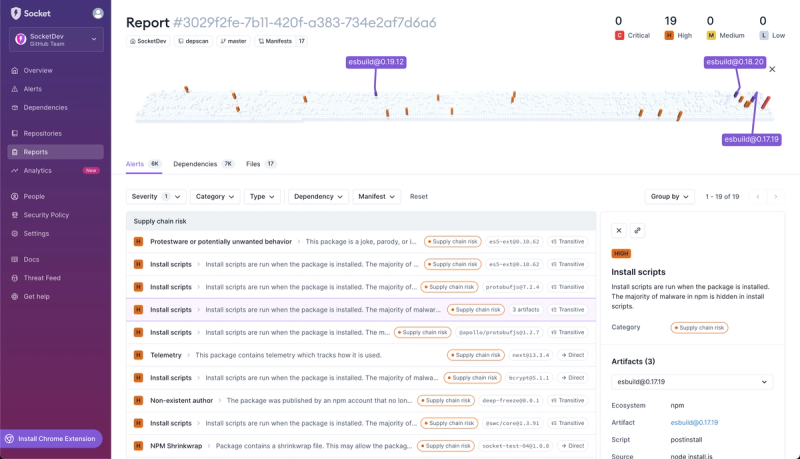
Company News
Connect with Socket at RSA and BSidesSF 2024
Come meet the Socket team at BSidesSF and RSA! We're sponsoring several fun networking events and we would love to see you there.
esrecurse
Advanced tools
Weekly downloads
Package description
The esrecurse npm package is designed for recursively walking through ECMAScript/JavaScript syntax trees. It is commonly used for static analysis, code transformation, and other tasks that involve traversing and manipulating the structure of JavaScript code.
Visiting nodes in an AST
This feature allows you to visit each node in an abstract syntax tree (AST) and perform actions based on the node type. In the code sample, `Literal` nodes are logged to the console.
const esrecurse = require('esrecurse');
esrecurse.visit(ast, {
Literal(node) {
console.log(node.value);
}
});Custom visitor keys
This feature allows you to define custom visitor keys for node types that are not part of the standard ECMAScript syntax. In the code sample, a `CustomNode` type is visited, and its `customProperty` is logged.
const esrecurse = require('esrecurse');
const visitorKeys = {
CustomNode: ['customProperty']
};
esrecurse.visit(ast, {
CustomNode(node) {
console.log(node.customProperty);
}
}, visitorKeys);Estraverse is a similar package that provides a simple interface for traversing and optionally replacing nodes in an AST. It is similar to esrecurse but has a more extensive API and additional features like the ability to replace nodes.
Acorn-walk is a part of the Acorn JS parser ecosystem and provides functionality for walking the AST generated by Acorn. It is similar to esrecurse but is tailored specifically for ASTs generated by Acorn and may not be as generic.
Readme
Esrecurse (esrecurse) is ECMAScript recursive traversing functionality.
The following code will output all variables declared at the root of a file.
esrecurse.visit(ast, {
XXXStatement: function (node) {
this.visit(node.left);
// do something...
this.visit(node.right);
}
});
We can use Visitor instance.
var visitor = new esrecurse.Visitor({
XXXStatement: function (node) {
this.visit(node.left);
// do something...
this.visit(node.right);
}
});
visitor.visit(ast);
We can inherit Visitor instance easily.
class Derived extends esrecurse.Visitor {
constructor()
{
super(null);
}
XXXStatement(node) {
}
}
function DerivedVisitor() {
esrecurse.Visitor.call(/* this for constructor */ this /* visitor object automatically becomes this. */);
}
util.inherits(DerivedVisitor, esrecurse.Visitor);
DerivedVisitor.prototype.XXXStatement = function (node) {
this.visit(node.left);
// do something...
this.visit(node.right);
};
And you can invoke default visiting operation inside custom visit operation.
function DerivedVisitor() {
esrecurse.Visitor.call(/* this for constructor */ this /* visitor object automatically becomes this. */);
}
util.inherits(DerivedVisitor, esrecurse.Visitor);
DerivedVisitor.prototype.XXXStatement = function (node) {
// do something...
this.visitChildren(node);
};
The childVisitorKeys option does customize the behaviour of this.visitChildren(node).
We can use user-defined node types.
// This tree contains a user-defined `TestExpression` node.
var tree = {
type: 'TestExpression',
// This 'argument' is the property containing the other **node**.
argument: {
type: 'Literal',
value: 20
},
// This 'extended' is the property not containing the other **node**.
extended: true
};
esrecurse.visit(
ast,
{
Literal: function (node) {
// do something...
}
},
{
// Extending the existing traversing rules.
childVisitorKeys: {
// TargetNodeName: [ 'keys', 'containing', 'the', 'other', '**node**' ]
TestExpression: ['argument']
}
}
);
We can use the fallback option as well.
If the fallback option is "iteration", esrecurse would visit all enumerable properties of unknown nodes.
Please note circular references cause the stack overflow. AST might have circular references in additional properties for some purpose (e.g. node.parent).
esrecurse.visit(
ast,
{
Literal: function (node) {
// do something...
}
},
{
fallback: 'iteration'
}
);
If the fallback option is a function, esrecurse calls this function to determine the enumerable properties of unknown nodes.
Please note circular references cause the stack overflow. AST might have circular references in additional properties for some purpose (e.g. node.parent).
esrecurse.visit(
ast,
{
Literal: function (node) {
// do something...
}
},
{
fallback: function (node) {
return Object.keys(node).filter(function(key) {
return key !== 'argument'
});
}
}
);
Copyright (C) 2014 Yusuke Suzuki (twitter: @Constellation) and other contributors.
Redistribution and use in source and binary forms, with or without modification, are permitted provided that the following conditions are met:
Redistributions of source code must retain the above copyright notice, this list of conditions and the following disclaimer.
Redistributions in binary form must reproduce the above copyright notice, this list of conditions and the following disclaimer in the documentation and/or other materials provided with the distribution.
THIS SOFTWARE IS PROVIDED BY THE COPYRIGHT HOLDERS AND CONTRIBUTORS "AS IS" AND ANY EXPRESS OR IMPLIED WARRANTIES, INCLUDING, BUT NOT LIMITED TO, THE IMPLIED WARRANTIES OF MERCHANTABILITY AND FITNESS FOR A PARTICULAR PURPOSE ARE DISCLAIMED. IN NO EVENT SHALL BE LIABLE FOR ANY DIRECT, INDIRECT, INCIDENTAL, SPECIAL, EXEMPLARY, OR CONSEQUENTIAL DAMAGES (INCLUDING, BUT NOT LIMITED TO, PROCUREMENT OF SUBSTITUTE GOODS OR SERVICES; LOSS OF USE, DATA, OR PROFITS; OR BUSINESS INTERRUPTION) HOWEVER CAUSED AND ON ANY THEORY OF LIABILITY, WHETHER IN CONTRACT, STRICT LIABILITY, OR TORT (INCLUDING NEGLIGENCE OR OTHERWISE) ARISING IN ANY WAY OUT OF THE USE OF THIS SOFTWARE, EVEN IF ADVISED OF THE POSSIBILITY OF SUCH DAMAGE.
FAQs
ECMAScript AST recursive visitor
The npm package esrecurse receives a total of 27,138,184 weekly downloads. As such, esrecurse popularity was classified as popular.
We found that esrecurse demonstrated a not healthy version release cadence and project activity because the last version was released a year ago. It has 3 open source maintainers collaborating on the project.
Did you know?

Socket for GitHub automatically highlights issues in each pull request and monitors the health of all your open source dependencies. Discover the contents of your packages and block harmful activity before you install or update your dependencies.

Company News
Come meet the Socket team at BSidesSF and RSA! We're sponsoring several fun networking events and we would love to see you there.

Security News
OSI is starting a conversation aimed at removing the excuse of the SaaS loophole for companies navigating licensing and the complexities of doing business with open source.

Product
We're introducing dependency visualization for reports - get a quick impression of the state of your dependencies without getting lost in the details.